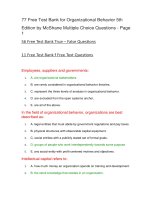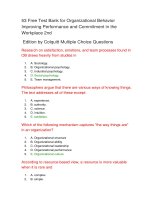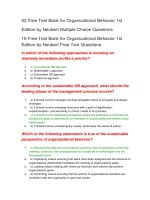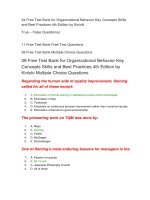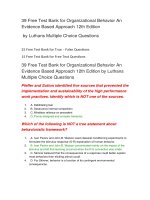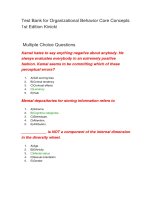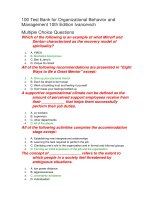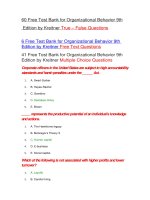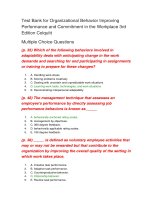120 test bank for organizational behavior core concepts 6th edition robert vecchio
Bạn đang xem bản rút gọn của tài liệu. Xem và tải ngay bản đầy đủ của tài liệu tại đây (123.1 KB, 20 trang )
120 Test Bank for Organizational Behavior Core
Concepts 6th Edition Robert Vecchio
Multiple Choice Questions
When Ben was interviewing a candidate for a job, he felt that
the “right” candidate should nonverbally behave in
particular ways. What might Ben think is the “right”
kind of nonverbal behavior?
1.
2.
3.
4.
5.
a. substantial eye contact
b. little eye contact
c. rapid eye blinking
d. finger fidgeting
e. all of the above
Which of the following are helpful clues in determining the
sincerity of one’s facial expressions?
1.
2.
3.
4.
5.
6.
a. A reaction may be dishonest if there is too much time between an emotionally
arousing event
and one’s facial reaction.
b. Dishonesty may be suspected if all the aspects of one’s facial expressions
agree.
c. Micro expressions are more likely to expose genuine emotions than those which
occur just
before one exercises facial control.
d. In most people, facial expressions are not good indicators of true feelings.
Although Glenn views himself as shy, unintelligent, and
unattractive, he attributes these traits to Don. Glenn’s
feelings about Don are probably indicative of
1.
2.
3.
4.
a. stereotypes.
b. a halo effect.
c. projection.
d. perceptual distortion.
Jesse wants to use a projective technique. In terms of
reliability of measurement, which of the following
would be most appropriate?
1.
2.
3.
4.
a. TAT
b. Sentence completion
c. Roget’s projective inventory
d. The Rorschach test
Manny is given a scale that asks him to rate himself. At one
end of the scale is the word “lazy,” while at the other
end of the scale is the work “hard-working.” This scale
is an example of a
1.
2.
3.
4.
a. personality rating.
b. situational test.
c. personality inventory.
d. projective technique.
Ted strongly believes that he can control events; John
strongly believes that he (John) cannot. These two
men differ on their
1.
2.
3.
4.
a. Machiavellianism.
b. authoritarianism.
c. locus of control.
d. risk-taking.
The idea that sex, race, or occupation determines one’s
behavior is most characteristic of which barrier to
accurate perception?
1.
2.
3.
4.
5.
a. projection
b. perceptual distortion
c. the halo effect
d. subliminal influences
e. stereotyping
Which of the following is a cognitive style that might be
identified by the Myers-Briggs type indicator?
1.
2.
3.
4.
5.
a. sensing/intuiting
b. sensing/feeling
c. thinking/feeling
d. acting/feeling
e. acting/thinking
In order to find out more about Frank’s personality, A1 asks
him to complete the sentence “If I had a chance, I
would.. . .” A1 is using an example of
1.
2.
3.
4.
a. personality ratings.
b. situational tests.
c. inventories.
d. projective techniques.
Which of the following BEST describes attribution theory?
1.
2.
3.
4.
5.
6.
7.
a. The components of personal power and trying are the most important aspects of
attribution
theory.
b. People perceive behavior as being caused by the individual being observed.
c. External causality, the crux of attribution theory, states that behavior is a
reaction to the
environment.
d. Attribution theory focuses on the inference process used to deduce the traits of
someone from
observations of behavior.
The barrier to accurate perception that occurs when a
perceiver’s evaluation of specific traits of an individual
is influenced by an overall impression is referred to
as:
1.
2.
3.
4.
5.
a. projection.
b. stereotyping.
c. perceptual distortion.
d. the halo effect.
e. subliminal influences.
Which of the following is the most widely used method of
assessing personality characteristics?
1.
2.
3.
4.
a. personality inventories
b. personality ratings
c. situational tests
d. projective techniques
When we attribute the behavior of others to internal factors,
what type of error are we making?
1.
2.
3.
4.
5.
a. A self-serving bias error
b. A fundamental attribution error
c. A halo error
d. A central tendency error
e. None of the above
Lola said that a person’s facial reactions provide her with
cues that a person is probably acting deceptively.
Which of the following cues might she use?
1.
2.
3.
4.
a. the difference in time between an event and the person’s facial reaction
b. inconsistent facial expressions
c. very brief expressions on the person’s face
d. all of the above
George always takes credit for things when they go right, but
always blames his advisors when things go wrong.
What type of error is George making?
1.
2.
3.
4.
5.
a. a stereotype
b. a halo effect
c. projection
d. a fundamental attribution error
e. a self-serving bias
Which of the following best describes situational or
behavioral tests?
1.
2.
3.
4.
5.
a. Situational tests are more subjective than rating scales.
b. In situational tests, personality traits are observed in an artificial setting.
c. Situational tests involve the direct observation of behavior in a designed setting.
d. The results are usually less valid than those obtained with other measures.
e. Most traits are easily measured with situational tests.
Which of the following is characteristic of people who are
good judges of others?
1.
2.
3.
4.
5.
a. There is a strong orientation toward the social sciences.
b. They are very sensitive to small differences among people.
c. They are highly intelligent and possess good emotional adjustment.
d. They tend to dislike crowds and social situations.
e. They tend to prefer working with other people.
Dr. Amiri is the first-born child in her family. Based on this
knowledge, what might you conclude about Dr. Amiri?
1.
2.
3.
4.
a. She is less likely to be schizophrenic than her siblings.
b. She is likely to be very independent.
c. She is likely to be less cooperative than her siblings.
d. She is more likely to be influenced by social pressure.
Which of the following can be concluded regarding eye
contact?
1.
2.
a. When people avoid eye contact, it is due to being shy.
b. The less eye contact that occurs between two people, the more favorable they
perceive their
3. relationship to be.
4. c. Eye contact is possibly the most important nonverbal cue used in perceiving
and judging others.
5. d. All of the above.
The tendency to perceive trait X in an individual, because we
assume that trait Y exists, is known as:
1.
2.
3.
4.
5.
a. implicit personality theory.
b. attribution theory.
c. central traits.
d. contingency theory.
e. balance theory.
Twenty years ago, Val’s mother had a nervous breakdown.
Although there has been no problem with Val’s
mother’s work habits at any time, James considers her
“unreliable.” James’ belief is similar to
1.
2.
3.
4.
a. stereotypes.
b. a halo effect.
c. projection.
d. perceptual distortion.
Which of the following is an advantage to using ratings for
measuring personality attributes?
1.
2.
3.
4.
5.
a. Ratings are sometimes less biased.
b. Results discriminate among individuals.
c. The meanings associated with the anchors need not be clearly defined.
d. Raters need not directly observe the traits in question.
e. Ratings are well known and frequently used.
Studies of identical twins separated at birth seem to indicate
that:
1.
2.
3.
4.
a. heredity influences personality.
b. culture is not very significant in determining personality.
c. the environment is the predominate determining factor of one’s personality.
d. parents determine the personalities of the children even when the children are
adopted.
5. e. heredity plays little or no part in the determination of personality.
Jane thought it best not to hire Ashley because she has red
hair. “Redheads,” Jane said, “are short-tempered.”
Jane’s beliefs exemplify
1.
2.
3.
4.
a. a stereotype.
b. a halo effect.
c. projection.
d. perceptual distortion.
Story-telling devices and sentence completions are
examples of:
1.
2.
3.
4.
a. situational techniques.
b. projective techniques.
c. personality ratings.
d. personality inventories.
The most widely used storytelling technique is the
1.
2.
3.
4.
a. Thematic Apperception Test.
b. Sentence completions technique.
c. Internal-external control scale.
d. Myers-Briggs Type Indicator.
Felicia tends to be sympathetic, to prefer social harmony,
and to get along well with others. Her cognitive style is
likely to be:
1.
2.
3.
4.
a. feeling.
b. thinking.
c. intuiting.
d. sensing.
Bill always blames people’s problems on some internal
character flaw. What type of error is Bill making?
1.
2.
3.
4.
5.
a. a stereotype
b. a halo effect
c. projection
d. a fundamental attribution error
e. a self-serving bias
Eric left a ten dollar bill on his desk one day, and went home,
leaving only Chris there. Eric wanted to see if Chris
was honest, or if he would take the bill. Eric’s action is
similar to
1.
2.
3.
4.
a. personality ratings.
b. situational tests.
c. inventories.
d. projective techniques.
Due to environmental influences, first-born children are more
likely to ______________ than later born children.
1.
2.
3.
a. be independent
b. demand attention
c. be listed in Who’s Who
4.
5.
d. be less ambitious
e. be less influenced by social pressures
The barrier to accurate perception that arises from the
tendency to be influenced by our own interests is
known as:
1.
2.
3.
4.
5.
a. stereotyping.
b. halo effect.
c. projection.
d. perceptual distortion.
e. selective perception.
Internally oriented individuals, that is, individuals with a high
internal locus of control, are characterized by:
1.
2.
3.
4.
a. high susceptibility to group pressures.
b. membership in the upper class (i.e., better educated, higher income level).
c. preferring rewards such as pay and job security.
d. remaining static on the career ladder.
Joshua wants to hire a personnel manager who will be a
good judge of prospective employees. Which one of
the following traits should he look for in the manager,
according to research findings?
1.
2.
3.
4.
a. a background in psychology
b. a background in anthropology
c. an interest in physics
d. a background in counseling
Tonya is accepting of authoritarian leadership and prefers
concrete jobs. Tonya is likely to score high on
1.
2.
3.
4.
a. Machiavellianism.
b. authoritarianism.
c. risk-taking.
d. the work ethic.
When we take credit for successes and place the blame for
failure on external, environmental causes, what type of
error are we making?
1.
2.
3.
4.
5.
a. self-serving bias error
b. fundamental attribution error
c. halo error
d. central tendency error
e. none of the above
Kathy said that it is very important to be able to accurately
assess the emotions and personality of her workers.
Why is this true?
1.
2.
3.
4.
a. It helps us to gauge the effects of our words and actions.
b. It helps us to be passive observers of behavior.
c. Most people try to hide their true feelings.
d. It helps us to be able to read their thoughts.
A popular model of moral judgment was developed and
tested by
1.
2.
3.
4.
5.
a. Carl Gustav Jung.
b. Katherine Briggs.
c. Lawrence Kohlberg.
d. Charles Darwin.
e. None of the above.
True - False Questions
When people try to predict another’s behavior from
subjective assessments of personality, they are
surprisingly successful.
1.
2.
True
False
Research findings indicate that most of us are able to
identify certain emotional states from facial
expressions since several of these expressions are
universally recognized.
1.
2.
True
False
Personality can be defined as relatively short-lived traits and
dispositions that form a pattern that distinguishes one
person from all others.
1.
2.
True
False
Research shows that physically attractive people are
perceived to be more sociable, mentally healthy,
intelligent, and socially skilled than less attractive
people despite evidence that shows they are lonely
and less sexually active.
1.
2.
True
False
Personality ratings are often uninformative due to the
reluctance of raters to use extremely negative ratings
on the scales.
1.
2.
True
False
Staring is often disruptive and carries undertones of hatred
and potential aggression.
1.
2.
True
False
Increased eye blinking is associated with psychological
stress in that people blink more often when excited or
angry.
1.
2.
True
False
First-born children tend to receive more attention at first but
are then expected to behave more responsibly in
looking after younger children.
1.
2.
True
False
Individuals at stage six of Kohlberg’s stages of moral
development engage in stereotypical good behavior,
living up to what is expected of them.
1.
2.
True
False
Attribution theory generalizes from one individual’s behavior
to groups of others.
1.
2.
True
False
The term attribution is used to describe the process people
go through to explain the causes of the behavior of
others.
1.
2.
True
False
The perceptual process is one that is passive, receptive, and
determined by the attributes of the observed object.
1.
2.
True
False
Projection is the tendency to ascribe our own feelings and
attributes to others.
1.
2.
True
False
Subtle shifts in the tone or pitch of a person’s voice may
indicate deception.
1.
2.
True
False
The only instance in which the halo effect occurs is when a
perceiver uses a general impression of favorableness
as the basis for judgments about more specific traits.
1.
2.
True
False
When you begin to notice a particular type of car on the
street much more frequently you are experiencing
selective projection.
1.
2.
True
False
Knowing something about an individual’s personality traits
can be highly useful in interpersonal relations.
1.
2.
True
False
Even though heredity may predispose an individual to
certain patterns of behavior, it can be concluded that
the environment is the sole determinant of personality.
1.
True
2.
False
Students sometimes manifest the self-serving bias when
they attribute their success on tests to their
intellectual prowess or having studied hard, and
attribute their poor test performance to unfair test
construction by the teacher.
1.
2.
True
False
Unverified beliefs about people based on their membership
in some readily identifiable group are termed
stereotypes.
1.
2.
True
False
Through environmental forces, it is relatively easy to alter an
individual’s personality.
1.
2.
True
False
When we make a fundamental attribution error, we attribute
behaviors of others to external factors.
1.
2.
True
False
People with an intuiting/ thinking cognitive style tend to be
logical, but ingenious.
1.
2.
True
False
Typically, evaluators are not reluctant to use the extreme
negative positions on rating scales, allowing the rating
results to be very informative.
1.
2.
True
False
Situational tests offer many advantages, especially in that
they are more subjective than rating scales.
1.
2.
True
False
Perception is a relatively simple process that involves the
perceiver participating in selecting, structuring, and
interpreting experiences.
1.
2.
True
False
Text Questions - Page 1
One who feels that he has no control over his own destiny
has a high _______ locus of control.
Answer Given
external
When using a rating system for assessing personality, the
ratings will often be found to group around the _____
end of the scale.
Answer Given
positive
During one test of honesty, soldiers were given a series of
numerical problems with access to the answer book,
but instructions not to use it. This is an example of
a(n) _________.
Answer Given
situational test
In addition to story-telling devices, ________ is a second
type of projective technique.
Answer Given
sentence completion
Examples of projective techniques include __________ and
________.
Answer Given
story-telling devices, sentence completions
If one believes that the origins of an individual’s personality
are primarily determined genetically at conception,
then one is taking a ________ point of view.
Answer Given
hereditary
A physician, accountant, or computer programmer may be
predicted to be_________, according to Carl Jung’s
model of cognitive styles.
Answer Given
sensing/ thinking
_____, a device used for assessing personality, use point
scales with adjectives at the endpoints.
Answer Given
Personality ratings
According to Carl Jung’s model of cognitive styles,
__________ types prefer to deal with new possibilities
and dislike routine activities.
Answer Given
intuitive
The question, “Do you find it easy to make friends?” is one
that could be used in a personality assessment
technique known as a(n)_________.
Answer Given
personality inventories
_______and ______ relate to the process of knowing and
understanding others.
Answer Given
Perception, personality
People who believe that they are in control of the events
happening around them have a high _______ locus of
control.
Answer Given
internal
_______ is the individual generally associated with the
personality trait known as locus of control.
Answer Given
Julian Rotter
At the ________ level of Kohlberg’s stages of moral maturity,
the individual largely strives to live up to what is
expected by people close to him.
Answer Given
conventional
_________ are references that may be used to aid in finding
suitable personality inventory tests.
Answer Given
Mental Measurement Yearbook, or Tests in Print
The _______ embodies a cluster of beliefs centered on the
notion that if you work hard, you will be rewarded.
Answer Given
work ethic
Story-telling and sentence completions are examples of
________ designed to explore an individual’s
personality.
Answer Given
projective techniques
_______ are those involving the direct observation of an
individual’s behavior in a setting designed to provide
information about personality.
Answer Given
Situational tests
_______ are the most widely-used method of assessing
personality characteristics.
Answer Given
Personality inventories
The fact that research has found first-born children to be
more dependent, less likely to defy authority, and more
cooperative, provides evidence for the viewpoint that
personality is influenced by __________.
Answer Given
environment or culture
The most widely used story-telling technique in personality
assessment is known as the _______.
Answer Given
thematic apperception test
The extent to which people believe they personally control
what happens to them, as opposed to believing what
happens is due to environmental forces beyond their
control, is known as _______.
Answer Given
locus of control
Believers in the _______ point of view concerning the origins
of personality, advocate that the results of experience
can shape or alter personality.
Answer Given
environmental
_________ is the relatively enduring set of individual traits
and dispositions that form a pattern distinguishing one
person from all others.
Answer Given
Personality
47 Free Test Bank for Organizational Behavior Core
Concepts 6th Edition Robert Vecchio Free Text
Questions - Page 2
_______, one form of perceptual distortion, occur when our
perception of something does not reflect its reality.
Answer Given
Illusions
When one ascribes his own feelings and attributes to others,
he is engaging in a perceptual technique known as
_______.
Answer Given
projection
Compare two types of projective tests that are most
commonly used, in terms of the methods used to
gather information and the advantages and
disadvantages associated with each technique.
Answer Given
Two types are thematic apperception tests (story-telling) and sentence
completions.
______ is the error made when you take credit for your
successes but blame others for your failures.
Answer Given
Self-serving bias
Explain the differences between a fundamental attribution
error and a self-serving bias.
Answer Given
Fundamental attribution error is the attributing of someone else’s behavior to
internal causes while a self-serving bias is the taking credit for your own
successes while blaming the environment for your own failures.
The tendency to perceive a person as being industrious,
given that he is honest, is predicted by ________.
Answer Given
implicit personality theory
The “Big Five” personality dimensions are important
because they are associated with antecedents of
_______ as well as other work-related tendencies.
Answer Given
employee effectiveness
Describe each of the barriers to accurate perception.
Answer Given
Students should describe the following: stereotyping, halo effect, projection,
perceptual distortion, subliminal influences, and selective perception.
________ is a nonverbal cue that is aggressive in nature and
conveys a message that is often regarded as hostile.
Answer Given
Staring
According to attribution theory, people who initiate actions
(rather than react to their environment) exemplify
______.
Answer Given
internal causality
Defending our egos by projecting feelings and attributes
onto others, or denying that something occurred or
that we have witnessed something is known as
________.
Answer Given
perceptual distortion
If, after purchasing a blue sports car, you begin to notice the
appearance of this type of car on the street with a high
frequency, you are experiencing ________.
Answer Given
selective perception
The saying, “There’s more to the issue of perception than
actually meets the eye” means that the perceiver is
__________in the construction of his or her
experiences.
Answer Given
actively involved
______ occurs when one deliberately pays attention only to
what he or she wants to see.
Answer Given
Perceptual distortion
Present the differing viewpoints regarding heredity vs.
environment as determinants of personality.
Answer Given
Heredity- personality is determined by genetic factors. Environment- personality is
determined by culture and environment.
The _______ explains why a subordinate who is liked by a
supervisor can do no wrong in the supervisor’s eyes,
while a subordinate who is disliked may have difficulty
obtaining a favorable review from the same supervisor.
Answer Given
halo effect
In judging others, ________ is the most important nonverbal
cue.
Answer Given
eye contact
_______ is when you attribute the behavior of others to
internal factors.
Answer Given
Fundamental attribution error
_______ typically convey the same meaning regardless of an
individual’s culture.
Answer Given
Facial expressions
Eye contact that is carried to extremes, such as staring,
however, is socially ______ but disruptive.
Answer Given
arousing
Certain ________, such as shifts in posture and scratching,
may indicate nervousness; which in turn, suggest
possible deceit.
Answer Given
nonverbal cues
One barrier to accurate perception is ________, which
occurs when judgments are made based on group
affiliation.
Answer Given
stereotyping
At the _________ level of Kohlberg’s stages of moral
development, the individual follows self-chosen
principles, even when laws violate these principles.
Answer Given
principled

